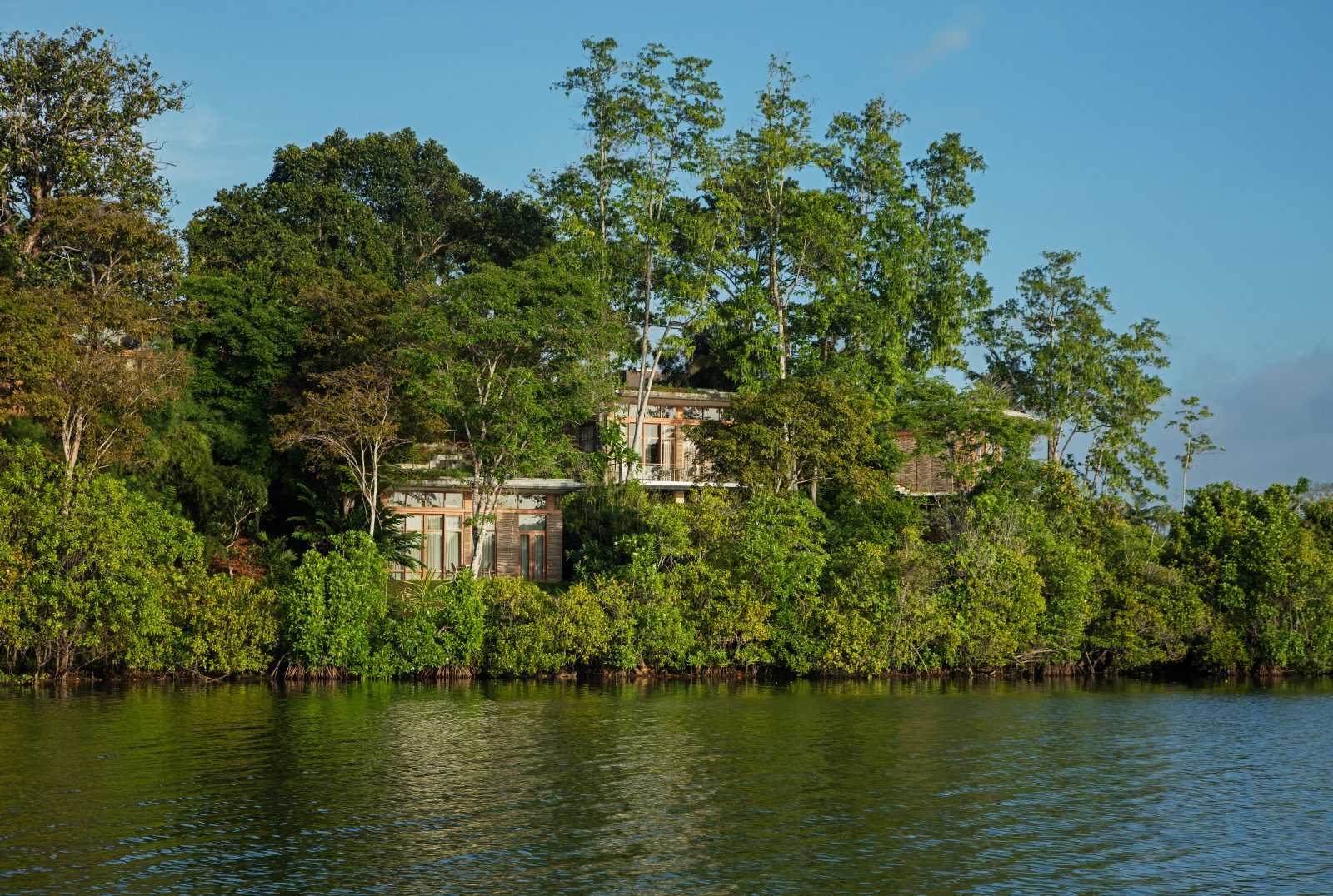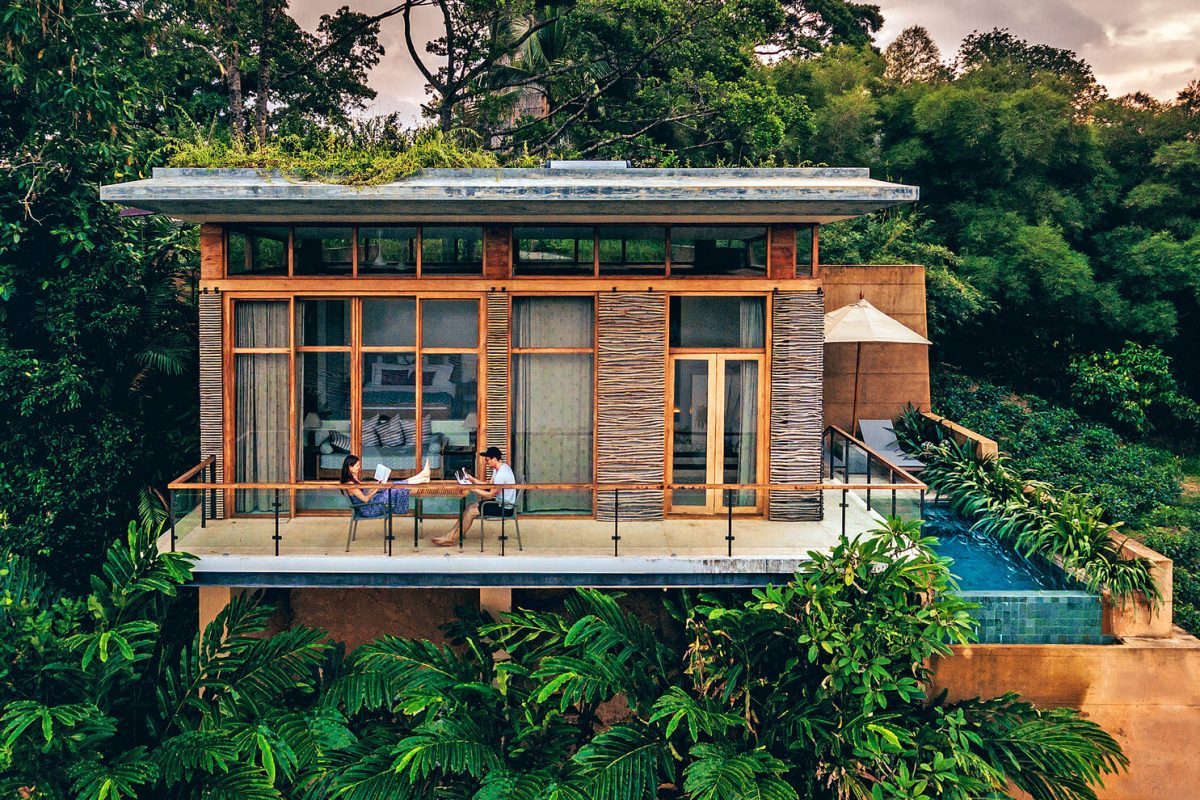Sri Lanka Resorts
A Lakeside Retreat in Sri Lanka’s Southern Province

Tri, in Sri Lanka’s lakeside Southern Province, offers guests an unexpected, chilled-out retreat, far from the hustle-bustle

Tri, in Sri Lanka’s lakeside Southern Province, offers guests an unexpected, chilled-out retreat, far from the hustle-bustle
There’s something about the winding, narrow roads that lead to Tri – the high hedgerows, the low-lying fields, the potholes – that reminds me of the British countryside. Other things set the Galle District in the Southern Province of Sri Lanka apart, too: the banana leaves that form the canopy, the elegant birds that stalk the grasslands, the tuk tuks instead of tractors. But it’s when you climb to the top floor of Tri’s cinnamon-wood-covered hilltop water tower, nestled in the eco-luxe hotel’s six-acre grounds, that you realise just how unique this quiet, paradisiacal corner of Sri Lanka really is: forest on one side, Lake Koggala on the other, and the hectic sounds of bustling Sri Lanka melting into the distance.
Tri came into being as a genre-defining eco-luxe hotel before Sri Lanka’s tourism boom, and as an architectural gem jutting out into the still waters of Lake Koggala, it is a destination in its own right. The passion project of husband and wife team Robert and Laura Drummond, Tri is has remained true to its vision of “providing a unique, contemporary, Sri Lankan experience that connects you with nature, culture and creativity”. Stand-alone suites open out onto private pools and far-reaching views, Sri Lankan food is served from handmade ceramic bowls, and a glass-walled library is lined with books on the country’s history and heritage. Below the library sits the stone-walled spa, with two treatment rooms nestled in the hillside. A yoga shall with panoramic views plays host to twice daily classes, and local staff lead trips to temples, tea plantations and beaches. It nods to Sri Lankan culture in more ways than one, but Tri inspires a feeling that is different from other Sri Lankan hotels – an almost ethereal, decidedly un-Sri Lankan stillness. The country is renowned for its vibrancy and its colour, but Tri, by contrast, is tranquil and muted. The green of the trees is soft, the sunlight is gentle and the water is calm; even the birds seem to have got the memo, with the usual multi-layered cacophony of songs refined to a simple, spaced-out series of melodies.
We arrive to Tri’s quietude at mid-afternoon, when the air is still hot on our skin. Four men greet us in the dusty driveway. Two carry our bags to our room, the other two show us along the stone path to reception, which is an open-air space overlooking the lake, and past symmetrically-spaced sun beds lining an infinity pool that melts into the horizon. From a cushioned booth, we drink sweet iced tea and listen as our host, Sasindu, explains the Tri operations: Yoga classes on demand, boat trips on the lake, cocktails delivered to anywhere on the property by calling the bar on the mobile phone found in our room. This is luxury, but there’s a considered approach – the bamboo straws in the welcome drinks, the warmth in the smiles – that reflects a more wholesome, purposeful spirit.
Tri is sustainably-focused, with a ‘create more, consume less’ philosophy, and the accommodations – ranging from kingsize suites to family villas complete with private plunge pools – showcase living walls, green roofs, 100% recycled wood and entirely local materials. Eleven rooms are currently on offer, but next month the hotel will close for a six month renovation project, which will see the addition of ten new rooms. We’re staying in a pool suite – a spacious, stand-alone structure with floor-to-ceiling windows on either side, and tall glass doors opening onto a balcony and a plunge pool that stretches towards the lake. Two glass bottles of iced water stand on the sideboard next to a glass jar filled with Sri Lankan, chilli-fried cassava chips and a vase of freshly cut flowers. The stone-walled waterfall shower is stocked with organic Kemara toiletries, and a letter from the manager sits on the kingsize bed, wrapped in straw and outlining the Tri ethos.
We open the doors wide to the clean, lakeside air and the sounds of the forest, and prepare to settle in. We could order wine to our room, but we decide to head up to the pool and take in the atmosphere of the bar, where music is gently ringing out as the sun sinks behind the mangroves on the west side of the lake. A reflection of the coconut tree that stands in the left corner of the infinity pool forms on the glassy surface, broken by a swimmer who laps slowly, pausing every few strokes to look out into the calm. Swallows sweep down towards the lake and up into the sky as the sunset turns it a warm, honey gold.
Dinner at Tri varies every day, from six course degustation menus to traditional Sri Lankan curries, and while the restaurant – below the reception, at almost-eye level with the lake – is beautiful, we decide to opt for room service from our balcony. It’s late by the time we order, but without much delay beautifully prepared dishes are delivered straight to our table, and we eat under the stars as bats fly overhead and into the forest. Along with the sweet, flaky coconut cakes that arrive wrapped in paper for turndown service, is a small card and the quote that reads: “Work like you don’t need the money, love like you’ve never been hurt, dance like nobody’s watching”. With it’s slow, calming ambience, Tri doesn’t feel like the kind of place to hit the dance floor, but we appreciate the sentiment.
Rising before the sun, we walk barefoot through the lawns to the water tower, and climb the spiral staircase to the top to watch the powder-pink sky of dawn change to golden yellow as the region wakes from its slumber. From the open restaurant, we’re served a four course breakfast of homemade granola with fresh fruit and iced goats curd, Sri Lankan porridge, pastries with homemade preserves and eggs benedict with smoked mahi mahi.
With a mission to explore, we rent a motorbike and speed along the highway past fruit stands and tree-lined train tracks to Galle, the historic fort town first colonised by the Portuguese in the 17th century. We wander through narrow, cinnamon-scented streets, past art galleries and spice shops, until we find a shady rooftop serving coconut roti and spicy dahl. Taking the bike back along the busy road, running parallel to the sparkling ocean, we stop for coconuts on the roadside after the tourist-centric town of Unuwatuna, and take a swim in the sea to cool off from the heat of the day.
Returning to Tri’s verdant grounds, lakeside views and heartfelt service (think warm towels on arrival) is relaxing on an almost cellular level, and there are few reasons to leave this peaceful retreat. The Kip, however, just a twenty minute tuk tuk ride away, is one of them. An artfully, soulfully curated Italian garden restaurant and boutique guest house, The Kip has been recommended to us by almost everyone we’ve met in Sri Lanka’s Southern Province, and we decide to fit in an evening dinner at this deeply loved local restaurant. In the walled garden of a white pillared colonial house, the evening passes under the warm light of flame torches as attentive staff serve a refined, contemporary Italian menu of fresh burrata, handmade pink tortellini, polenta chips with shaved brie and mushroom ragu. The tuk tuk ride back to Tri sees us wind through quiet roads, with our headlight illuminating lizards, peacocks, monkeys and chipmunks as they all head back to their forest beds; none quite as luxurious as ours.
Leaving the curtains that wrap around our room open through the night, we wake slowly on the morning of our departure to the gentle hint of sunrise bathing the room in a gentle, pink light. As we check out, a Swiss woman checks in, and between sips of her welcome iced tea says under her breath, “It’s so beautiful”. She’s just arrived at Tri, and for her there is so much more to come. We’re not ready to leave, and avert our envious eyes.
Latest Articles
Don't miss the latest from Luxury Travel
